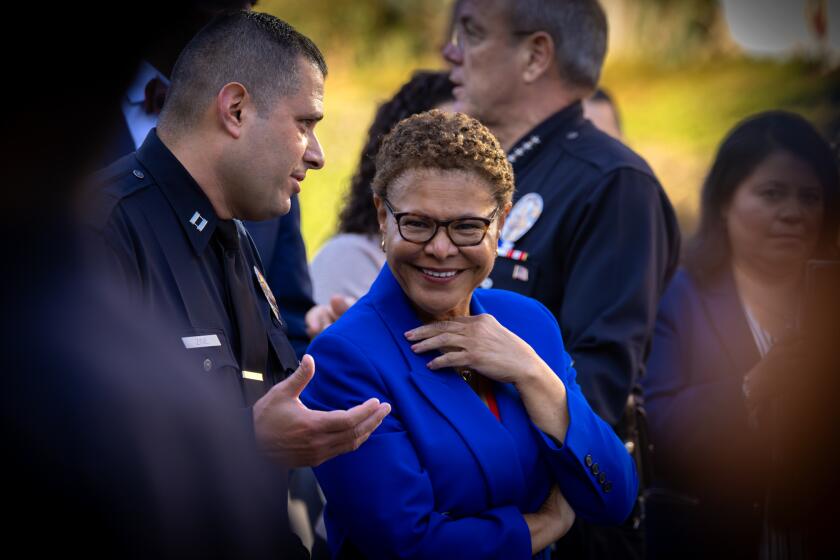Study on Black Male Students Debated : Critics Say Achievement Report Downplays Schools’ Responsibility
The few black male teen-agers who do well academically in San Diego city schools have strong adult role models--at home, in the classroom or both--who promote not only their study but also their learning about society and their own futures, the San Diego Board of Education was told Tuesday.
That difference between black males making it academically and those struggling in class is at the heart of a new study commissioned by the board, which engendered strong debate immediately after its presentation.
The study examines why some black males succeed in the face of sobering statistics that show that black males, not only in San Diego but nationwide, drop out, receive more suspensions and have lower grades than all other ethnic groups.
Little Improvement Seen
Last year, for example, only 23 of 444 black male seniors graduating from city schools had grade point averages of 3.0 or above, out of a maximum of 4.0.
School administrators ordered the study last year as part of an effort to find new ways to approach instruction of black males, since a host of compensatory and special-education programs during the last decade appear to have had little effect on improving overall achievement. A committee of principals and teachers is already at work trying to come up with new instructional approaches based on the report.
But the report came under strong criticism for seeming to place too much responsibility on the students’ home environment and not enough on the need for teachers and school administrators to adopt new teaching methods and attitudes toward blacks by recognizing cultural differences.
Several conclusions were also questioned because they appear to contradict previous studies as well as traditional notions about barriers to black male achievement.
Many educators have held that low self-esteem is a principal cause of low black achievement and have said that academically inclined blacks are often criticized by their peers as being “white.”
Case studies of 20 black seniors in San Diego high schools form the crux of the three-part report and contain the most compelling information for school trustees. In those studies, by psychologist Alonzo B. Anderson of USC, some students were classified as high-achieving, based on an average grade point of 2.83, and others were labeled as low-achieving, with a 1.65 grade-point average.
Greater Dynamics at Home
Anderson found that, although all the students had some sort of nuclear or extended family system providing support for academic achievement, the situation for high-achieving black teen-agers was far more dynamic in that adults regularly provided opportunities for extended conversations about books, music, television and classroom performance.
“There was more opportunity for the youngster to note and develop a perception of the world,” Anderson told trustees.
Anderson also reported that no student, whether defined as a high or low achiever, reported peer pressure not to do well, contrary to what many other studies have shown, and he said that positive self-esteem did not seem to be related to strong achievement.
Anderson said that all students “felt OK” about their teachers but that low achievers did not look upon teachers or counselors as people they could turn to when in trouble or needed help, whether academic or social. Almost all students believed the teachers felt no obligation to them beyond the classroom.
Anderson said that high achievers have a more realistic view of the racism he said affects their ability to achieve in American society, in large part because they have had greater contact with adults in developing their view.
“They can observe and even experience racism, but if they have a mind to challenge and fight back, they learn you can still achieve,” Anderson said, citing his own experience as a black trying to counter low expectations of his ability.
‘A Lot of Complacency’
Despite Anderson’s caution that the study is not meant as a definitive answer to black male achievement, there were strong critiques during the subsequent public hearing.
George Frey, assistant superintendent for the district’s integration programs, said the study ignores classroom issues and could lead “to a lot of complacency” on the part of teachers because it appears to put most of the blame on the home environment.
“Yes, some things have to happen in the home, but clearly the classroom is important, too,” Frey said.
For example, Frey said, too many teachers at predominantly white schools where blacks voluntarily bus as part of district integration have low expectations for them. He said the teachers seldom call on black males during classroom discussions and arrange class seating unfairly. He said “we know that some kids are looked at less with a smile on the face” of the teacher.
“The black male is estranged in the classroom,” Frey said.
Trustee Jim Roache wanted to know how the data developed by Anderson would differ if the same study were done for Asian or Latino males.
Nurturing Differences?
Anderson said that, although nurturing from adults is important for all children, “I would say there are cultural variations between ethnic groups” affecting the way the nurturing is done.
Board member Shirley Weber picked up on that theme, saying the report does not adequately address cultural variables that apply to black males. Too often, Weber said, administrators have looked at solutions she labeled “Eurocentric.”
Weber argued for immediate programs to remedy that outlook, saying the few black males employed at district schools are almost always on the playground as aides “keeping kids from killing each other,” rather than in the classroom helping out in an academic role.
“We need to talk about fundamental changes, such as in the curriculum, where every hero other than Martin Luther King is white,” Weber said. “But what if a student doesn’t want to be a civil rights leader?”
San Diego City College counselor Arthur Boyd, who helped plan a conference on black males last weekend, said some of the report’s data conflicts with conclusions drawn by almost 1,000 black males who attended the conference.
“The need for strong self-concept and self-image, we tend to lack that,” said Boyd, a member of the Committee for the Retention of Black Males in Higher Education. “The black male (at the conference) was saying that (self-esteem) can’t be separated from academics.”
Both Roache and Weber raised an even more sobering point, noting that the report draws conclusions only from those students who have remained in school, and not from the almost 40% of black teen-agers who have dropped out.
Roache summed up the board’s anguish in asking, “How can we as public educators develop a support system for these students as individuals, for those kids still in school, let alone those who have become disenchanted and already have left?”
More to Read
Sign up for Essential California
The most important California stories and recommendations in your inbox every morning.
You may occasionally receive promotional content from the Los Angeles Times.










